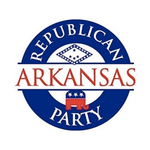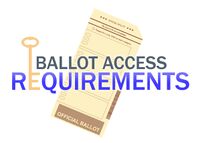| Republican Party of Arkansas | |
 | |
| Basic facts | |
| Location: | Little Rock, Ark. |
| Type: | Political party |
| Affiliation: | Republican |
| Top official: | Jonelle Fulmer, Chair |
| Website: | Official website |
The Republican Party of Arkansas is the Arkansas political party affiliate of the national Republican Party. The group is headquartered in Little Rock, Arkansas.
Background[edit]
Arkansas has a Republican trifecta. The Republican Party controls the office of governor and both chambers of the state legislature.
Platform[edit]
The party's 2016 platform is composed of six main issues:[1]
- Economic prosperity and job growth
"The State of Arkansas is the Land of Opportunity. The abundant resources of our Natural State are blessings equaled only by the hardworking people who call her home." - Education reform
"The education of Arkansans goes hand-in-hand with our desire to grow the state economically. To become a greater player on the global stage, our children must be given the tools to succeed in their chosen fields through education." - Government reform
"Reform of government begins with the election of trustworthy and qualified Arkansas Republicans to office at every level of government. This will ensure responsible and effective management of our state’s fiscal and natural resources, and honor the hardworking taxpayers which those who hold office serve." - Justice reform
"We strongly believe that all legal proceedings should be conducted and adjudicated based solely on the United States Constitution, the Arkansas Constitution and the statutory and case law framework of federal and state law, without reference to or influence by any foreign law." - Domestic security
"We believe the global war on terror is the transcendent challenge of this generation. We support a federal and state homeland security policy that knows our enemy, stops terrorists before they attack, and treats terrorism as a martial rather than criminal offense." - Individual freedom
"The First Amendment to the United States Constitution guarantees the free exercise of religion. Article 2 of the Arkansas Constitution guarantees that 'no human authority can, in any case or manner whatsoever, control or interfere with the right of conscience.'"
Rules and bylaws[edit]
| Candidate ballot access |
|---|
| Find detailed information on ballot access requirements in all 50 states and Washington, D.C. |
The state party is governed by a set of rules and bylaws. Typically, these give structure to the different levels of organization—local, county, and state committees—and establish protocol for electing committee members. The bylaws also typically give details on the party's process for nominating and sending delegates to the national party convention during presidential elections. The following is a selection of the Arkansas Republican Party's rules. This selection focuses on the structure and governance of the party:[2]
- The party consists of the state convention, the state committee, the state executive committee, the congressional district committees and county committees. The state committee has authority over party matters when a state convention is not in session.
- Procedures for electing delegates to the Republican National Committee are determined at the state convention in the year that the national convention is held.
Convention[edit]
The 2016 state convention for the Arkansas Republican Party, when the party selected its delegates for the Republican National Convention, took place on May 14, 2016.[3]
National convention delegate allocation, 2016[edit]
| Hover over the terms below to display definitions. | |
| Ballot access laws | |
| Primary election | |
| Caucus | |
| Delegate | |
A political party formally nominates its presidential candidate at a national nominating convention. At this convention, state delegates select the party's nominee. Prior to the nominating convention, the states conduct presidential preference primaries or caucuses. Generally speaking, only state-recognized parties—such as the Democratic Party and the Republican Party—conduct primaries and caucuses. These elections measure voter preference for the various candidates and help determine which delegates will be sent to the national nominating convention.[4][5][6]
The Democratic National Committee and the Republican National Committee, the governing bodies of the nation's two major parties, establish their own guidelines for the presidential nomination process. State-level affiliates of the parties also have some say in determining rules and provisions in their own states. Individuals interested in learning more about the nomination process should contact the political parties themselves for full details.
Arkansas had 40 delegates at the 2016 Republican National Convention. Of this total, 12 were district-level delegates (three for each of the state's four congressional districts). District-level delegates were allocated on a proportional basis; the highest vote-getter in a district received two of that district's delegates, and the second highest vote-getter received the remaining delegate. If a candidate won more than 50 percent of the vote in a district, he or she received all three of that district's delegates.[7][8]
Of the remaining 28 delegates, 25 served at large. At-large delegates were allocated on a proportional basis; a candidate had to win at least 15 percent of the statewide vote in order to receive any at-large delegates. Each candidate who met the 15 percent threshold received one delegate. If a candidate won more than 50 percent of the statewide vote, he or she was allocated the remaining at-large delegates. If no candidate won a majority of the statewide vote, the unallocated at-large delegates were divided proportionally among those candidates who met the 15 percent threshold. In addition, three national party leaders (identified on the chart below as RNC delegates) served as bound delegates to the Republican National Convention.[7][8]
Leadership[edit]
As of July 2022, the executive director of the Arkansas Republican Party was Sarah Jo Reynolds.[9]
The website for the Arkansas Republican Party listed the following individuals as the party's state leadership as of July 2022:[10]
- Jonelle Fulmer, Chairwoman
- Mindy McAlindon, National committeewoman
- Jonathan Barnett, National committeeman
- John Parke, First vice chairman
- Sharon Brooks, Second vice chairman
- Alisha Curtis, Treasurer
- Julie Harris, Secretary
- Sarah Dunklin, First Congressional District chair
- Melonaie Gullick, Second Congressional District chair
- Susan Gessler, Third Congressional District chair
- Eddie Arnold, Fourth Congressional District chair
State political party revenue[edit]
The Democratic Party and the Republican Party maintain state affiliates in all 50 states, the District of Columbia, and select U.S. territories. The following maps display total state political party revenue per capita for the Democratic and Republican state party affiliates from 2011 to 2016. The blue map displays Democratic state parties and the red map displays Republican state parties. Click on a state below to view the state party's revenue per capita totals:
Total Democratic and Republican state political party revenue per capita in the United States, 2011-2016
Recent news[edit]
The link below is to the most recent stories in a Google news search for the terms 'Arkansas Republican Party'. These results are automatically generated from Google. Ballotpedia does not curate or endorse these articles.
See also[edit]
External links[edit]
- Arkansas Republican Party Website
- Arkansas Republican Party on Facebook
- Arkansas Republican Party on Twitter
Footnotes[edit]
- ↑ Arkansas Republican Party, "Arkansas Republican Platform 2016," accessed June 21, 2017
- ↑ Arkansas Republican Party, "Party Rules," July 18, 2015
- ↑ Arkansas Republican Party, "Calendar," accessed October 1, 2015
- ↑ Vote Smart, "Government 101: United States Presidential Primary," accessed August 15, 2015
- ↑ The Washington Post, "Everything you need to know about how the presidential primary works," May 12, 2015
- ↑ FactCheck.org, "Caucus vs. Primary," April 8, 2008
- ↑ 7.0 7.1 Republican National Committee, "2016 Presidential Nominating Process," accessed October 6, 2015
- ↑ 8.0 8.1 CNN.com, "Republican National Convention roll call vote," accessed July 20, 2016
- ↑ Arkansas Republican Party, "Staff," accessed July 21, 2022
- ↑ Arkansas Republican Party, "Arkansas GOP Leadership," accessed July 21, 2022
| ||||||||||



